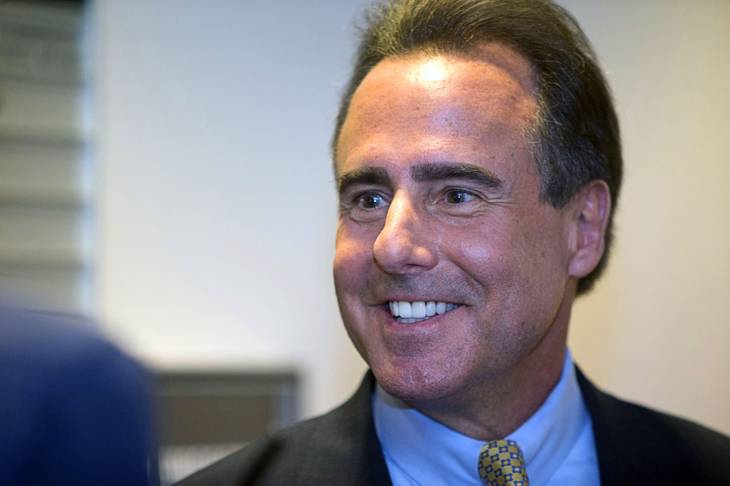Caesars Entertainment Corp. CEO Mark Frissora was granted a license from state gaming regulators today after responding to concerns about his record at his last job and the bankruptcy of Caesars’ main operating division.
The Nevada Gaming Commission unanimously agreed to grant a license to Frissora following a lengthy period of questioning that focused in large part on his exit from Hertz Global Holdings Inc. and some ongoing issues surrounding the bankruptcy.
Frissora took the reins of Caesars last year and received initial regulatory approval from the Gaming Control Board two weeks ago.
As was the case at his control board appearance, regulators today first heard a lot about Frissora’s departure from Hertz, the rental car company he led from 2006 until September 2014.
Hertz referenced “personal issues” when announcing that Frissora stepped down, but his exit came as the company was dealing with accounting problems, and some investors had called for his departure.
In a June 2014 filing with the Securities and Exchange Commission, Hertz said it had identified accounting errors that meant it would have to restate financial statements for 2011 and revise 2012 and 2013 results.
Bloomberg later reported that certain investors wanted Frissora replaced, with one spokesman saying he had made “some serious missteps.”
Then, in November 2014, after Frissora was already gone, Hertz said it would also have to restate financial results for 2012 and 2013. The restatements were completed in July, when Hertz said in an SEC filing that it found an “inconsistent and inappropriate” tone at the top of the company. The filing said that Frissora’s “management style and temperament” led to a “pressurized operating environment.”
But Frissora has pushed back on that characterization, and his attorneys have said there was no indication that Frissora did anything wrong or that he was aware of the accounting issues before they came to light.
The Caesars bankruptcy, meanwhile, predates Frissora’s time there, but it has been underway since he started the job.
The company’s Caesars Entertainment Operating Co. division, which controls Caesars Palace and numerous properties outside Las Vegas, filed for bankruptcy protection in January 2015 in an effort to shed some $10 billion in debt. The case continues to work its way through a Chicago court and reached a major milestone this week with the issuing of a key report from a bankruptcy examiner.
The examiner’s report said Caesars and its private equity owners may need to pay as much as $5.1 billion in damages over a series of deals that took strong assets away from the now-bankrupt CEOC division, Reuters reported. When asked about the bankruptcy at today’s meeting, Frissora said he gets weekly updates but stressed that he is removed from the decision-making for that case.
Still, Frissora said he hoped for a positive outcome, and he cast the examiner’s report as an important development that could speed the process along by helping the company get a restructuring deal in place.
Another bankruptcy-related concern that arose today involved dozens of former Caesars employees who stopped receiving retirement payments after the bankruptcy case started. The commission heard about that last March, and Thomas Gallagher, the former head of Park Place Entertainment, brought the issue up at the outset of today’s commission meeting. Park Place eventually became a part of the company that is now Caesars.
Gallagher said he had tried to advocate on behalf of the retired workers, but he had trouble making any headway with Caesars.
“This is a flea compared to the elephants in the room. This is tiny,” he said during public comment. “It has not been a priority, and that’s part of the problem. And the strategy has just been to keep putting it off.”
Commission Chairman Tony Alamo asked Frissora about the payments and tried to balance concern for the retirees with an understanding that Caesars needs to restructure and ease its massive debt load.
“The last thing we want to do is get in the way of something that may cause the lights to go off,” Alamo said. “But at the same time, I’m human...When people come before us and say those things, of course it doesn’t fall on deaf ears.”
Frissora said he would make an effort to help and facilitate discussion on the issue, but he could not make any promises.
“Doing the right thing is always the best solution,” he said. “I’ll do everything I can to help, but we’ll see how it plays out.”
Frissora also spoke of Caesars’ plans to revamp about 4,800 rooms in Las Vegas this year and his views on doing more with technology to make casinos more attractive Millennials. To that end, he said, Caesars plans to develop a “casino of the future” inside one of its existing Strip resorts within the next year.
In other business, the commission also today approved a license for George Markantonis, president of the Venetian, Palazzo and the Sands Expo and Convention Center, who stepped into that role at the Las Vegas Sands Corp. properties a year ago.
